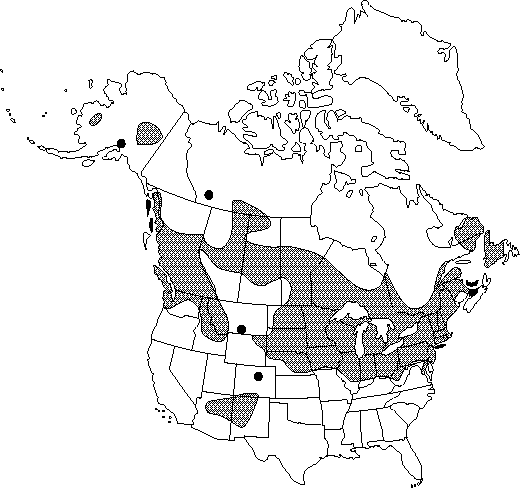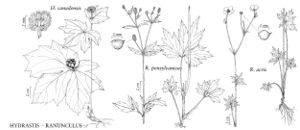Difference between revisions of "Ranunculus pensylvanicus"
Suppl. Pl., 272. 1782.
imported>Volume Importer |
imported>Volume Importer |
||
| Line 54: | Line 54: | ||
|publication year=1782 | |publication year=1782 | ||
|special status=Endemic;Illustrated | |special status=Endemic;Illustrated | ||
| − | |source xml=https:// | + | |source xml=https://bitbucket.org/aafc-mbb/fna-data-curation/src/2e0870ddd59836b60bcf96646a41e87ea5a5943a/coarse_grained_fna_xml/V3/V3_84.xml |
|genus=Ranunculus | |genus=Ranunculus | ||
|subgenus=Ranunculus subg. Ranunculus | |subgenus=Ranunculus subg. Ranunculus | ||
Revision as of 21:51, 5 November 2020
Stems erect, never rooting nodally, hispid, base not bulbous. Roots never tuberous. Basal leaf blades broadly cordate in outline, 3-foliolate, 1.6-7 × 3-9 cm, leaflets cleft, usually deeply so, ultimate segments narrowly elliptic, margins toothed, apex acute. Flowers: receptacle hirsute; sepals reflexed ca. 1 mm above base, 3-5 × 1.5-2 mm, ± hispid; petals 5, yellow, 2-4 × 1-2.5 mm. Heads of achenes cylindric, 9-12 × 5-7 mm; achenes 1.8-2.8 × 1.6-2 mm, glabrous, margin forming narrow rib 0.1-0.2 mm wide; beak persistent, broadly lanceolate or nearly deltate, straight or nearly so, 0.6-0.8 mm. 2n = 16.
Phenology: Flowering late spring–summer (Jun–Aug).
Habitat: Stream banks, bogs, moist clearings, depressions in woodlands
Elevation: 0-1700 m
Distribution

Alta., B.C., Man., N.B., Nfld. and Labr. (Nfld.), N.W.T., N.S., Ont., P.E.I., Que., Sask., Alaska, Ariz., Colo., Conn., Del., D.C., Idaho, Ill., Ind., Iowa, Maine, Md., Mass., Mich., Minn., Mont., Nebr., N.H., N.J., N.Mex., N.Y., N.Dak., Ohio, Pa., R.I., S.Dak., Vt., Wash., W.Va., Wis., Wyo.
Discussion
Ojibwa tribes used Ranunculus pensylvanicus as a hunting medicine; the Potawatomi used it as an astringent for miscellaneous diseases (D. E. Moerman 1986).
Selected References
None.
